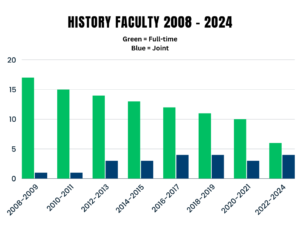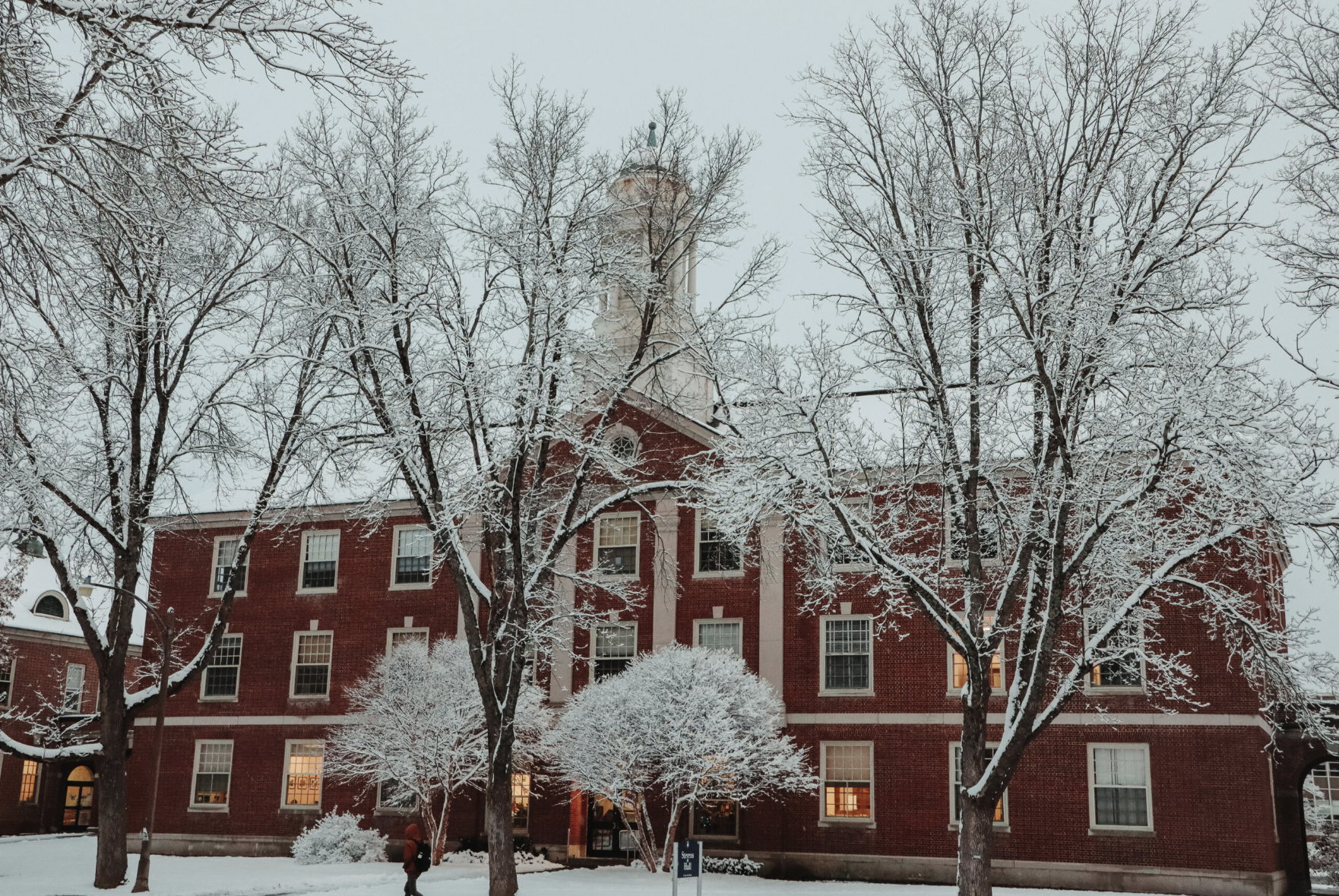The University of Maine History Department faces inconsistencies between what is expected of students and the resources available to them. There may be valid reasons to temporarily revise or restructure the list of compulsory history classes to more closely correspond with the actual opportunities offered.
UMaine provides a digital catalog of courses mandatory to all undergraduate students. Its purpose is to track progress and fulfill required sections on a semester-by-semester basis.
The Fall 2022 History Major Requirement Checklist calls for two three-credit courses in U.S. History, two in European History, two 300 to 400-level courses outside of those geographical regions, four additional history classes and two seminars.
According to a UMaine System Sharepoint chart, the number of undergraduate students in UMaine’s history department increased by 11% between 2014 and 2023. As of last year, 98 students are pursuing a Bachelor’s degree in History.

The number of full-time history professors has decreased by approximately 54% since 2014, based on data provided by History Department Chair Stephen Miller, which has been converted into the bar graph above. There are two tenured professors in History at this time. The department’s website has four adjunct members listed under faculty.
In November of 2022, the faculty senate briefly mentioned that a total of 80 professors would be stepping down following the 2022 to 2023 academic year. At the April 5 meeting, Emmanuel Boss and Mike Scott inquired about a faculty recruitment plan.
“Provost Volin said they are working with Kelly Sparks and are hopeful that within the next week or so to release those open positions; some they will try to immediately fill, look at a January hire for some and August 2024 for others,” According to page three of the April 5, 2023 faculty senate Minutes.
“Mike Scott asked about the delayed hiring in January; he felt it seemed late to do a search. Provost Volin said they are working with the deans to offer some positions now, primarily searching for January and August starts. The clear message they want is we want no one to settle, if they are not getting people they need, they should restart and not settle for a candidate,” page 17 of the April 5, 2023 minutes.
Amanda Levesque is a third-year undergraduate student who specializes in ancient history. She is a member of the History Club and represents the Honors College Student Activity Board in the UMaine General Student Senate. Levesque has experienced certain drawbacks in the history department that may be common among her peers.
Levesque conveyed that there are situations of students unable to make the cut for courses that are necessary for a Bachelor’s degree in history. The difficulty of enrollment is partially due to classes filling up quickly and because many are not offered regularly.
Associates and department partners will sometimes teach courses over summer or winter break periods. However, extra semesters are not covered by merit scholarships, and students who are signed up must pay out of pocket or through loans.
There is a strong prominence of specialized topics within history. Levesque explained that four professors on campus cover the period between the American Revolution and the Age of Discovery. Two different professors teach WWI and WWII.
“We have one medieval historian. He is the only one, and currently, he’s on sabbatical. If anyone wants to take his Vikings course or needs to take their history of ancient and medieval Europe, you can’t take it until he comes back. Nobody else teaches that except for him,” said Levesque.
UMaine, unlike most universities, does not have concentrations in history. Students are expected to take a wide range of courses outside their areas of expertise. Concentrations account for at least 30% of the major’s requirement. Some examples are Ancient History, History of Gender and Sexuality, European, African, Asian and Latin American Histories.
Levesque has also noticed an increase in class sizes. 100-level courses can have upwards of 50 students, with some sections having been moved online due to mass enrollment.
“Even 30 can be okay, but they’ve been pushing classes of one degree into that of others. So, in the history department, there’s a class coming up next semester being pushed towards the Classics and the Anthropology departments… once you get past 30, you can’t have class discussions anymore,” Levesque said.
Teaching Assistant (TA) Nolan Merz is a graduate student of history who took another perspective on these issues. Three professors have left the department since his transfer to UMaine in 2021.
“We’re in a rebuilding period right now. The hiring process is intense. It’s multiple days of meeting with all the professors, teaching presentations, research presentations and lunches with undergrads and graduate students. We just had a couple of people go through that process,” said Merz.
UMaine is slowly adding faculty into the department to gauge interest in specific courses and specialties. Positions have been publicly requested online, which reveals that searches are being conducted.
Levesque feels that some staff members are overwhelmed or overbooked due to the department’s faculty-to-student ratio of approximately 16 to one.
“Everybody is stretched so thin. It’s putting a lot on students to do really well and give really good reviews of professors, even if we might not want to give them a good review, because we need them here,” Levesque said.
Merz mentioned that his department has been allotted a total of eight TAs, meaning that staff is full in that particular division. History recently received its highest number of applications from graduate students in years.
“The one thing I really want to convey is that while I think the history department itself might be in a lull, it doesn’t mean it’s struggling,” said Merz. “There is enthusiasm by professors, there are great discussions in the building every day. Work is getting done.”








